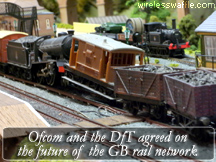Thursday 30 August, 2018, 14:45 - Spectrum Management, Much Ado About Nothing
Posted by Administrator
Posted by Administrator
 Ofcom has published a report called "Advice to Government on improving rail passenger access to data services, Spectrum for trackside connectivity solutions and rail passenger data demand". In it, they examine the amount of data needed to supply connectivity to passengers and then which spectrum band is best suited to supply these needs.
Ofcom has published a report called "Advice to Government on improving rail passenger access to data services, Spectrum for trackside connectivity solutions and rail passenger data demand". In it, they examine the amount of data needed to supply connectivity to passengers and then which spectrum band is best suited to supply these needs.The amount of data that each passenger will be consuming each month is taken directly from Ofcom's "Mobile Data Strategy" which was published in 2016. These range from 50 to 200 Gbytes per month in 2025 depending on the scenario. The report assumes that 80% of this data is offloaded onto WiFi and that it will be a WiFi service that is provided on the train.
 If this is the case, the average user will consume between 40 and 160 Gbytes of WiFi data per month, which is 1.3 to 5.3 Gbytes per day. If we take Ofcom's figures that there will be between 600 and 1440 passengers on busy commuter trains, and that a typical commute on a train lasts 1 hour, then the total amount of data per hour consumed by all the passengers between 33 and 315 Gbytes. This, in turn, equates to a connectivity requirement of between 73 and 700 Mbps. Of course, this assumes that every passenger on the train uses the WiFi service that is provided, which is unlikely to be the case, especially (as Ofcom also notes) if the service requires a payment to connect to.
If this is the case, the average user will consume between 40 and 160 Gbytes of WiFi data per month, which is 1.3 to 5.3 Gbytes per day. If we take Ofcom's figures that there will be between 600 and 1440 passengers on busy commuter trains, and that a typical commute on a train lasts 1 hour, then the total amount of data per hour consumed by all the passengers between 33 and 315 Gbytes. This, in turn, equates to a connectivity requirement of between 73 and 700 Mbps. Of course, this assumes that every passenger on the train uses the WiFi service that is provided, which is unlikely to be the case, especially (as Ofcom also notes) if the service requires a payment to connect to.Having presumably done the same calculations, Ofcom has arrived at a requirement of between 400 Mbps and 3.6 Gbps, or roughly 5 times more. So either train journey in Ofcom's world are 5 times longer, or people on trains are 5 times more hungry for data than normal individuals.
 Based on these figures, Ofcom have assumed that a benchmark connectivity speed should be around 1 Gbps for trains. It has then gone on to analyse the various spectrum options, and decided that the only band that can deliver the necessary connectivity is the 26 GHz band, which is one of the bands being touted for future 5G services. It completely excludes, for example, the use of the 2.7 - 2.9 GHz band as it claims that this could only deliver 100 Mbps of connectivity (assuming that 40 MHz of it could be made available). It also discounts the 5.4 GHz band as this could only deliver 'a few hundred Mbps'.
Based on these figures, Ofcom have assumed that a benchmark connectivity speed should be around 1 Gbps for trains. It has then gone on to analyse the various spectrum options, and decided that the only band that can deliver the necessary connectivity is the 26 GHz band, which is one of the bands being touted for future 5G services. It completely excludes, for example, the use of the 2.7 - 2.9 GHz band as it claims that this could only deliver 100 Mbps of connectivity (assuming that 40 MHz of it could be made available). It also discounts the 5.4 GHz band as this could only deliver 'a few hundred Mbps'. There are, though, significant issues with the 26 GHz band:
- Coverage of a 26 GHz 'cell' is expected to be a few 100 metres only, which would mean tens of thousands of cells would be needed to cover the UK rail network.
- Trains run at up to 200 km/h, this places extreme demands on handovers if cells are close together, let alone dealing with Doppler shift and Rayleigh fading.
- The 26 GHz band has been identified as a 'pioneer' band for 5G services in Europe and is likely to be in high demand from mobile operators for their future mobile services.
 There is, however, a very simple solution to the whole problem. If we shrink the size of the rail network to be only a few hundred metres long, then the 26 GHz solution will work perfectly. This, perversely, seems to be the plan of the Department for Transport who allow companies such as Southern, Thameslink, Hull Trains and Northern Trains to implement new timetables that effectively reduce the rail network to set of toys, that can't convey passengers anyway. Bravo, Ofcom, for realising that the rail industry will be reduced to OO-gauge before long anyway.
There is, however, a very simple solution to the whole problem. If we shrink the size of the rail network to be only a few hundred metres long, then the 26 GHz solution will work perfectly. This, perversely, seems to be the plan of the Department for Transport who allow companies such as Southern, Thameslink, Hull Trains and Northern Trains to implement new timetables that effectively reduce the rail network to set of toys, that can't convey passengers anyway. Bravo, Ofcom, for realising that the rail industry will be reduced to OO-gauge before long anyway.add comment
( 626 views )
| permalink
| 



 ( 2.9 / 4112 )
( 2.9 / 4112 )




 ( 2.9 / 4112 )
( 2.9 / 4112 )

